- Home
- Anders de la Motte
Rites of Spring Page 25
Rites of Spring Read online
Page 25
She sits down on the bottom step and tries to gather her thoughts. How long will it be before someone misses her? Before David starts searching for her? Not until this evening, or tonight. Will the torch batteries last that long?
A sudden noise makes her jump.
Barking. Emee is barking, right outside the cellar. Thea moves towards the sound, shines the torch on the wall behind the pile of wood. She can hear Emee scratching at something; a wooden hatch that must lead out to the front of the house.
She pulls down enough logs to be able to scramble up onto the pile and try the hatch. It refuses to move. Presumably it’s bolted on the outside, like the doors and windows, but unlike the hatch in the kitchen, this one must have been exposed to the weather. The wood feels porous, rotten.
Thea rearranges the logs until she has created a flat platform. She lies on her back, draws up her legs and kicks hard. After four kicks she feels something give way. After six she can see the light, finding its way in between the planks. Emee is still scratching and whimpering on the other side.
‘Out of the way, sweetheart!’
She keeps on kicking, harder and faster. Five more kicks – the bolt gives way and the hatch flies open. Thea crawls out into the yard and Emee hurls herself at her, clambering all over her, licking her face.
Thea gets to her feet, brushes off the dirt and fills her lungs with air. Relief and Emee’s welcome have brought her to the verge of tears, but she mustn’t cry. She has to stay alert.
Someone locked her in, someone who presumably followed her to Svartgården. But who, and why?
She looks at her watch, realises that she doesn’t have time to go into that now. She also suspects that the answer isn’t here. The person responsible has too much of a head start. She must get back to the village.
She sets off as fast as she can, and finds the track almost without needing to ask her phone for help. As she walks she looks in vain for traces of the person who must have followed her, while trying to recall what she saw from the bottom of the steps. The person’s torch dazzled her, so she couldn’t make out any facial features, or even be sure if it was a man or a woman. The wellington boots aren’t much to go on.
It starts raining just as she reaches the car, a cold spring rain that hammers on the roof. She jumps in and starts the engine, but as she’s about to switch on the wipers she sees something sitting on the windscreen.
A little Green Man figure.
61
T
he shock doesn’t catch up with her until she’s left the marsh. Suddenly she’s sweating, feeling totally exhausted. She’s already late for work, and considers calling in sick, driving back to the coach house, taking a long shower and thinking through what she’s seen and experienced.
However, before she reaches the turning for the castle, her phone rings.
‘Where are you?’ Dr Andersson says without preamble.
‘Er . . . In the car.’ Stupid answer – she should have pretended to be ill, but the sound of the engine would probably have given her away.
‘Why aren’t you at the surgery? It should have opened half an hour ago. I’ve already had two calls at home from angry patients.’
‘I overslept. Sorry.’
‘Overslept?’
The doctor doesn’t seem to be buying the lie. For a moment Thea gets the idea that the other woman knows where she’s been.
‘Yes – I really do apologise,’ she says hastily. ‘It won’t happen again.’
‘OK.’ Dr Andersson still doesn’t sound convinced. ‘When do you think you’ll be at the surgery?’
Thea passes the turning for the castle. ‘In ten minutes.’
‘Good. It’s important to stick to the opening times, Thea. Otherwise people start talking. Rumours spread quickly in the village.’
‘I understand. As I said, it won’t happen again.’
‘Fine.’ Her voice softens. ‘We’ll keep this little blip between us, Thea. Just this once. Drive carefully!’
*
Four patients are waiting in the corridor. Thea apologises, asks for two minutes to sort herself out. The look on their faces suggests that she might need longer.
She goes into her room and inspects herself in the mirror above the hand basin. Her face is streaked with dirt, her hair is full of dust. Her legs still feel wobbly.
She cleans herself up as best she can, then starts seeing her patients. She apologises once more; they make reassuring noises, but she can’t help feeling that she’s messed up.
At twelve o’clock she has a gap. She pops out to buy something for lunch, and takes Emee along. Her head is bursting with impressions from the morning. That gloomy boarded-up house, still standing deep in the marsh, filled with silent secrets. The terror of being locked in the cellar hasn’t left her.
Someone must have followed her, watched her from a distance, hidden in the shadows. It’s a horrible thought, and it gets worse as she goes through the details. She drove straight from the castle to the marsh as soon as it was light. She didn’t meet anyone on the main road, and if a car had followed her along the narrow forest track, then surely she would have seen it.
So how had the person in the wellington boots found her? How did he or she know that she was on the way to Svartgården, and why did they lock her in? She can answer the last question at least: for the same reason as they left a nasty little Green Man figure on her windscreen. To scare her, stop her digging into Elita Svart’s death.
As she leaves the community centre, a sports car pulls into the car park. It’s Sebastian. He stops in front of her and gets out.
‘Hi, Thea. I was coming to see you.’
‘Right – I’m on my way out, so . . .’
‘It’ll only take a minute.’ He looks around as if he wants to make sure that no one is listening. ‘It’s about the conversation in the dining room last night.’
‘I wasn’t eavesdropping.’
The lie is out before she has time to think. It’s obvious that she was eavesdropping, and Sebastian knows it, but he plays along.
‘Of course not, but as I’m sure you heard, we had a slight difference of opinion. Actually, I’d like to ask you a favour.’
‘Oh?’
‘When Nettan and I were approached about the castle project we were happy to get involved, both for the village and for David, particularly when we realised that the two of you were in some financial difficulties.’
The choice of words irritates Thea, but she decides not to say anything.
‘As you perhaps heard, David has kind of gone off the rails. The project has seriously exceeded the budget, and now he’s trying to give us an ultimatum. Either we come up with more money, or we lose the capital we’ve already invested. Nettan and I were hoping you might be able to persuade David to come to his senses. Stick to the plan.’
Thea shrugs. ‘David does what he wants. He doesn’t like other people telling him what to do.’
‘I know. He’s always been like that, ever since we were in school.’ Sebastian shakes his head, looking faintly amused. ‘The three of us took part in a radio quiz, did you know that? We got as far as the semi-final, and the scores were even. The last question was the decider. Nettan and I knew the answer, David didn’t agree – but it was two against one. David was our designated speaker, and when it was our turn he ignored what we’d said and gave his own answer.’
‘And you lost.’
‘By one point. The team that beat us went on to win the final. If David had stuck to the plan, then . . .’ He spreads his hands in a gesture of resignation. ‘We’re worried that he’s well on the way to making the same kind of mistake now – reaching the wrong decision off his own bat, and leaving Nettan and me to suffer the consequences.’
Thea nods. There’s a question she simply has to ask.
‘You were talking about Elita Svart yesterday, weren’t you?’
Sebastian stiffens.
‘So you heard that, even thou
gh you weren’t eavesdropping. How much do you know?’
‘That all four of you were there when she died – you, David, Nettan and Jan-Olof.’
‘We were.’
‘You told the police it was Leo who killed her.’
‘We said he was riding the horse,’ Sebastian corrects her. ‘Leo confessed to killing Elita.’
‘There are suggestions that he made his confession under duress.’
Sebastian shakes his head angrily.
‘That’s crap. It was Leo we saw. Elita had arranged for him to come galloping into the stone circle and frighten us away, and he did. We ran for our lives.’
‘Except for David. He went back. He saw Leo bending over Elita.’
‘Yes, but you need to talk to him about that, not me.’
Sebastian takes a deep breath, glances demonstratively at his heavy watch.
‘One last question,’ Thea says. ‘A Polaroid was taken at the sacrificial stone at some point before Walpurgis Night. Elita was dressed as the spring sacrifice, and the four of you were wearing animal masks. Who took the picture?’
He stares at her for a few seconds.
‘I’ve no idea. I think maybe Elita took it using the automatic timer, but it’s all so long ago. I can’t really recall the details, and to be honest, it’s not something any of us wants to rake over.’ He looks at his watch again; he’s had enough of her questions. ‘Anyway, I have to go, but as I said, Nettan and I would really appreciate it if you could help us out with David. Stop him from making a mistake that could cost us all dearly.’
He gives her a meaningful look before getting back in the car. As he drives past, Thea glances at the cramped back seat. On the floor is a pair of wellington boots.
62
S
he takes Emee for a walk and buys lunch at the local pizzeria. Tries to force it down at her desk.
She thinks about the wellington boots in Sebastian’s car; were they the same as the ones she saw at Svartgården? A pair of boots doesn’t make him a suspect, and what would Sebastian have to hide? He was twelve years old when everything happened.
Thea gets out her finds from Svartgården: the bubbly Polaroid Elita took of herself sitting on the bed, and the beret without its badge.
She looks at the photograph first, the blue case under the bed. Elita had packed her best clothes. She was planning to run away, not to die. But the case is missing.
She fingers the beret. The fabric smells of damp. Leo’s handwriting inside is unexpectedly neat. 223 Rasmussen.
There are several things about the beret that bother her. David and the others claimed that Leo was dressed as the Green Man when he came galloping into the glade, that he had a pair of antlers on his head, not his beret. He could have had it in his pocket, of course, but in that case how did he lose the badge? And what was the beret doing on the kitchen floor?
However, that’s far from the greatest mystery at Svartgården. The remaining three inhabitants clearly left in haste. Judging by the handprint, one of them was injured. Possibly Lasse.
So what happened? Why did they flee without packing any clothes or even grabbing their medication? And where did they go?
Thea adds those questions to the growing list in her head. What should she do next? She googles the book about false confessions.
The author has a homepage with both an email address and a mobile number. He answers almost right away. Kurt Bexell has a soft, melodic voice, and seems pleased that someone is interested in his work. Thea spins him a line, tells him she’s also a writer and is planning to write a true crime book about the case.
‘The spring sacrifice? Oh yes, I remember it well. It was an old friend in the probation service who gave me the heads up and put me in touch with Leo Rasmussen. The whole thing seemed very promising at first.’
‘Did you meet Leo?’
‘No, we spoke on the phone a few times. He was living overseas. I explained the premise of my book and told him about some similar cases. I said I’d read the transcripts of his interviews and thought he’d been affected by memory distrust syndrome. Do you know what that means? I describe it in considerable detail in the book.’
He doesn’t wait for her response; he’s excited to have the opportunity to hold forth on his area of expertise.
‘The suspect is under so much pressure that he no longer trusts his own memories. Eventually reality, fantasy and police claims merge, until he believes in his own guilt, or at least doubts his innocence. Stress, sleep deprivation and isolation combined with lengthy, difficult interviews and leading questions are strong contributory factors, and Leo was subjected to all of those things. He was also mentally fragile after his stepsister’s violent death, and the fact that his family had left him in the lurch.’
‘What did he say about your theory?’
‘Very little; he was pretty vague. He said he didn’t remember much, and that he’d served his time. I tried to get him to open up, but his answers became shorter and shorter, then he ended the call. However, I got the feeling that he’d started to think about what had happened. I put together a short chapter and moved on to other cases, hoping he’d come back to me in the future.’
‘And did he?’
‘Yes, but not exactly in the way I’d hoped.’ There was a brief silence on the other end of the line. ‘Leo called me a month or so after our original conversation. He was crying, and was obviously drunk. He kept saying that he loved his stepsister, and could never have hurt her.’
Thea can almost hear her heart beating.
‘I asked him to call me back when he was sober, but he never did. Instead his phone number stopped working. I finished the book, and after some hesitation I decided to include the case anyway. There weren’t many Swedish examples to choose from.’
‘Do you have an address for him?’
‘I’m afraid not – he never gave it to me. I believe he was living in the USA. That’s all I can tell you, I’m afraid.’
Thea thinks for a moment.
‘Did you ever hear that Elita Svart was pregnant when she died?’
‘No.’ Bexell sounds a little taken aback. ‘Was she? I have no recollection of that at all.’
‘I’m pretty sure she was, but the information seems to have been removed from the autopsy report.’
‘Interesting. I always had a vague feeling that not everything had come out. I actually drove down to Ljungslöv to speak to the officers who’d conducted the interviews. I really had to lean on the chief of police just to get a copy of the preliminary inquiry. Things got quite nasty towards the end; one of his heavies threatened to beat me up if I didn’t stop poking around in the case.’
Thea presses the phone closer to her ear.
‘What did he look like? Do you remember?’
‘Oh yes – it’s not often you get threatened by a cop in full uniform. He had a moustache; he was a nasty piece of work.’
‘Arne Backe?’ She can hear the agitation in her voice.
‘He never introduced himself – he just made it clear that it would be best if I got in my car and drove away, unless I wanted my balls crushed. I followed his advice,’ Bexell said dryly.
Thea tries to gather her thoughts. She has one more question.
‘Do you believe . . .’ She pauses, decides to carry on. ‘Do you believe Leo was telling the truth, that he really was innocent? After all, there were witnesses and forensic evidence.’
There is a brief silence.
‘It’s true that a lot of things pointed to him. Wasn’t some part of his uniform found at the scene?’
‘Yes, a cap badge. Plus there were hoof prints from a horse that was stabled at Svartgården, and the witnesses said they’d seen him on the horse.’
‘But those witnesses were children, and they ran away immediately, as I understand it. Except for the boy who came back, they can’t have seen much.’
‘David Nordin.’
‘That’s right, that was his name. Davi
d was the only one who said he’d seen Leo without the Green Man costume. He could easily have influenced his friends. They were interviewed together, which is highly irregular. Children have a tendency to back up one another’s stories. If one of them claimed that it was Leo they’d seen, and that person held a strong position within the group, it’s not impossible that the rest would just go along with him.’
‘So you do think Leo was innocent?’
Another silence.
‘Let me put it this way,’ Bexell says eventually. ‘I think there are certain aspects of Leo’s confession, the witness statements and the investigation as a whole that suggest he might have been.’
63
‘Do you remember the time we got a puncture out in the bush, and that bull elephant appeared? He stood and stared at us, maybe only fifteen metres away, snorting and scraping at the ground. Do you remember that sense of fascination, of danger? Then you’ll understand what I’m feeling right now.’
I
n her dream she is back in the cellar. At first, it’s the one from her childhood. Maybe she’s little too, little and terrified. Sitting with her back pressed up against the wall, listening to Daddy shouting on the other side of the door. Then everything changes. The cellar is older, damper. The ceiling is not made of solid concrete but of planks of wood, a small amount of light seeping through the gaps.
She can hear voices in the room above, a man and two women. She moves back and forth across the cellar floor, trying to peek between the planks, but all she can see are legs. A pair of wellingtons, two pairs of clogs.
The voices grow louder, angrier. A crash as a chair is knocked over directly above her head. She instinctively closes her eyes, protects her head with one arm.
Footsteps, shouting. Then a scream of pain.
Suddenly she is somewhere else. In the stone circle. Veils of mist hover around the ancient hawthorns. She is wearing a white dress, clutching two sets of antlers in her hands. Her feet are ice cold against the stone.
Elita Svart is standing opposite her. She looks the same as in the school photo. She has a Polaroid camera on a strap around her neck, and she is carrying a blue suitcase.

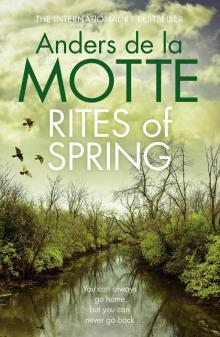 Rites of Spring
Rites of Spring Game: A Thriller
Game: A Thriller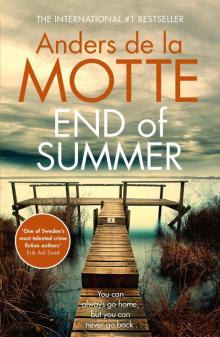 End of Summer
End of Summer Buzz: A Thriller
Buzz: A Thriller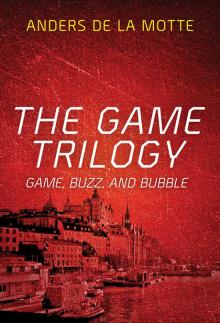 The Game Trilogy
The Game Trilogy Bubble: A Thriller
Bubble: A Thriller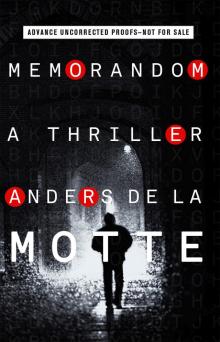 MemoRandom
MemoRandom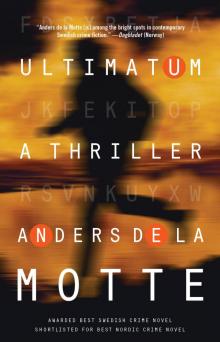 Ultimatum
Ultimatum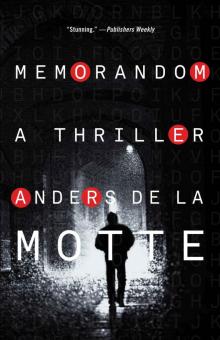 MemoRandom: A Thriller
MemoRandom: A Thriller